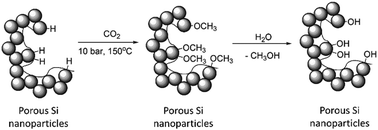CO2 to methanol conversion using hydride terminated porous silicon nanoparticles†
Abstract
Porous silicon nanoparticles (Si-NPs) prepared via magnesiothermic reduction were used to convert carbon dioxide (CO2) into methanol. The hydride surface of the silicon nanoparticles acted as a CO2 reducing reagent without any catalyst at temperatures above 100 °C. The Si nanoparticles were reused up to four times without significant loss in methanol yields. The reduction process was monitored using in situ FT-IR and the materials were characterized using SEM, TEM, NMR, XPS, and powder XRD techniques. The influence of reaction temperature, pressure, and Si-NP concentration on CO2 reduction were also investigated. Finally, Si particles produced directly from sand were used to convert CO2 to methanol.



 Please wait while we load your content...
Please wait while we load your content...